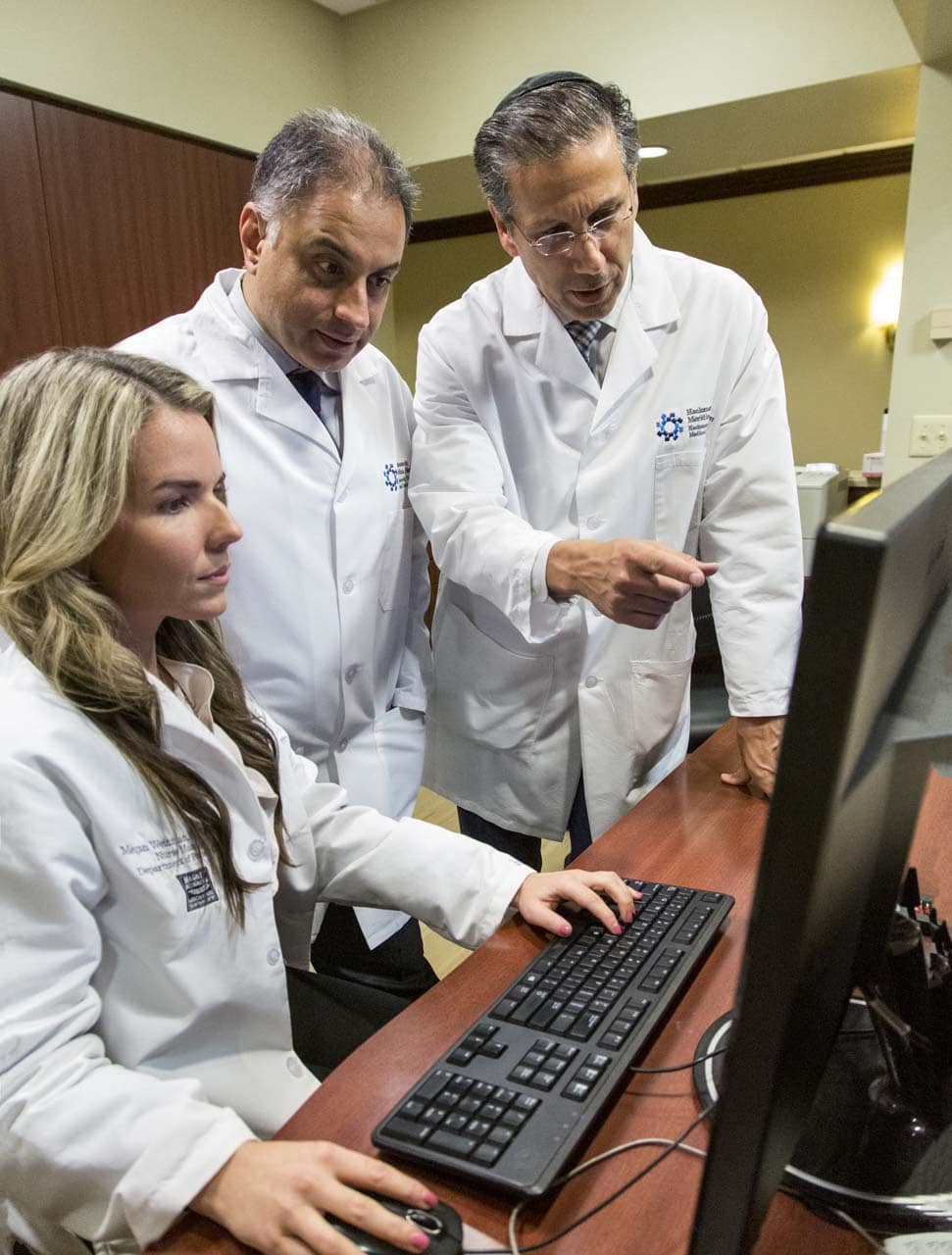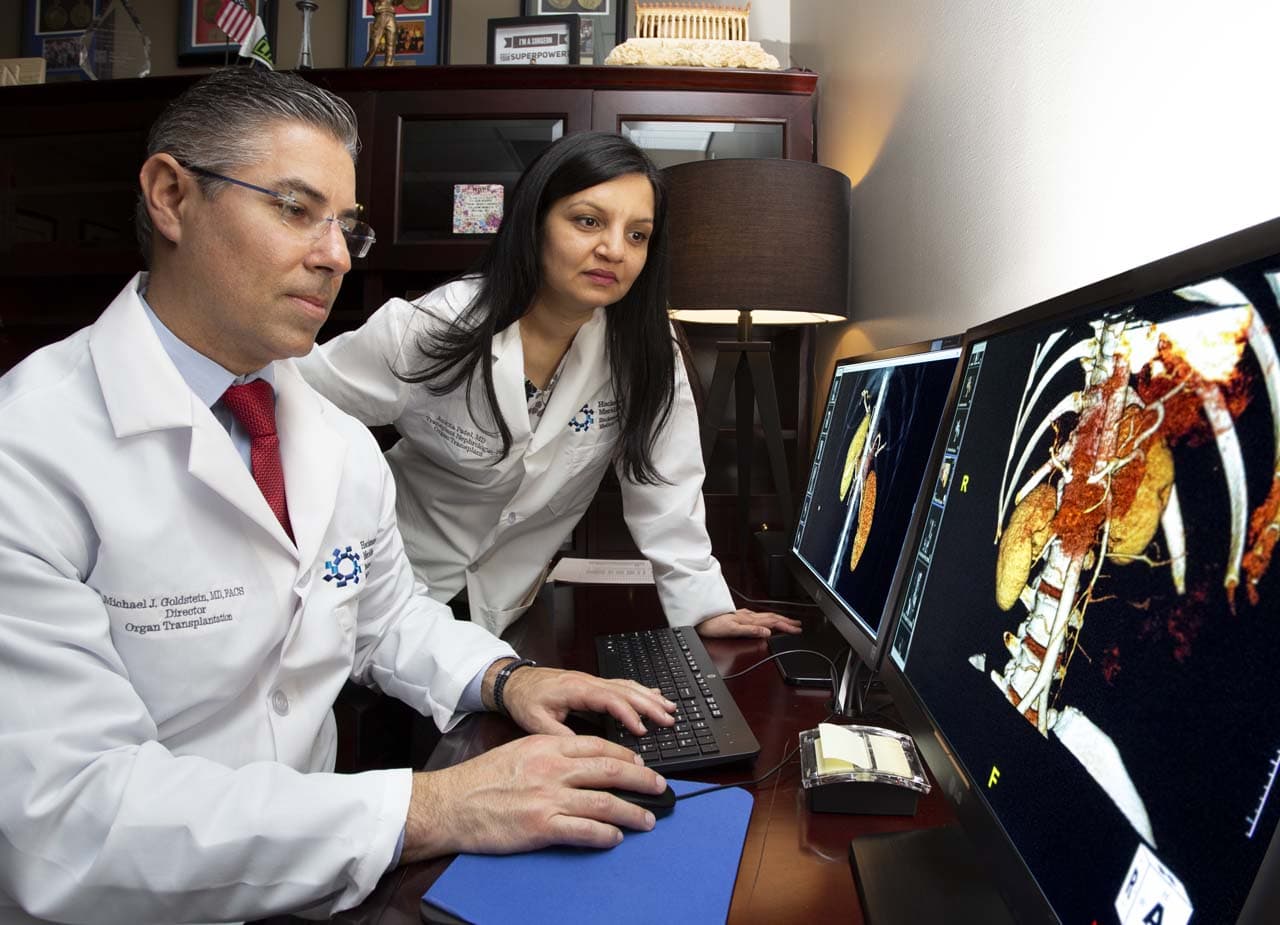HOW HACKENSACK MERIDIAN HEALTH ARRIVED AT THE FOREFRONT OF ORGAN TRANSPLANTATION BOASTING SOME OF THE BEST KIDNEY TRANSPLANT SURVIVAL RATES IN THE COUNTRY AND OUTCOMES SIGNIFICANTLY BETTER THAN THE NATIONAL AVERAGE
BY JESSICA JONES GORMAN • PHOTOS © AMESSÉ PHOTOGRAPHY
In mid-January, Dr. Michael J. Goldstein and the transplant team at Hackensack Meridian Hackensack University Medical Center’s Division of Organ Transplantation achieved something groundbreaking. According to Hackensack Meridian Health, Goldstein became the first surgeon in New Jersey to routinely perform kidney transplantation with organs preserved using the Life Port Kidney Transporter, a hypothermic machine perfusion system that increases a kidney’s viability and lifespan. The creation of the organ preservation center where such breakthroughs take place was a milestone for both the hospital and the residents of New Jersey.

“When kidneys are removed from donors, they are historically put in cold static storage and transported in cars or planes to the site of transplantation,” noted Dr. Goldstein, director of the Division of Abdominal Organ Transplantation and the program director of Kidney and Pancreatic Transplantation at Hackensack University Medical Center. “But the longer the kidney spends on ice without blood supply, the more it suffers damage. In many instances, organs can’t get to centers fast enough for patients to use them the cold ischemia time is unacceptable and for that reason, many thousands of organs are turned down each year.”
The hospital, which recently created an Organ Preservation Center, has been at the forefront of transplantation for the past several years, hitting landmark numbers in 2019 by performing 113 successful transplants. (A significant increase from 2016, when the team performed 40 successful transplants.) According to the Scientific Registry of Transplant Recipients, Hackensack University Medical Center is currently ranked second in the nation (among 263 transplant centers) at providing lifesaving deceased donor kidneys faster. It ranked third in the nation for the best kidney survival rate at one year after transplantation, and Dr. Goldstein explained that innovation in organ preservation will be a major part of the center’s continued success.
“Our goal is to increase patient access to organ transplantation with superior outcomes, and one of the ways we’re doing that is using this hypothermic device,” he said. “It’s not new the technology has existed for 40 years but we will continue to make advances for increasing utilization of organs, and with better outcomes.”

Now, with the introduction of the technology and the expertise of Dr. Goldstein, who has been using the device for over a decade, Hackensack Meridian Health can accept kidneys and other organs from all over the United States.
“Not only does the technology prolong the shelf life of the organ, allowing us to accept more donations, it also rehabilitates the kidney, making the organ function better,” he said, adding that new technology also includes a diagnostic component that can decipher whether or not an organ is viable for transplant. “Steps are also being taken to develop techniques which will allow the organs to rejuvenate. It really is a very innovative piece of equipment.”
Citing the vision of the hospital’s executive leadership to further develop transplantation and take it to the next level, Dr. Goldstein recalled that when he arrived at Hackensack Meridian Health in 2017, he was tasked with improving quality standards and outcomes, building a waiting list, and providing better access to organ transplants for patients in New Jersey. So, he began building a team to achieve those goals, including the hiring of new physicians, surgeons, and coordinators. Together, the team created new protocols and processes, efficiently listing patients for transplant and equipping the hospital with the latest innovations.
“We have been able to greatly improve the transplant rate here if a patient comes to Hackensack University Medical Center for a kidney transplant, they are two to three times more likely to receive a kidney than at other centers throughout the nation.” Dr. Goldstein said. “Those are statistics of which we are quite proud.”
He described how Hackensack Meridian Health’s board certified transplant surgeons work together with a multidisciplinary team of specialty physicians, specially trained transplant nurses, and other healthcare support professionals to guide patients throughout the process. Each is offered access to Certified Clinical Transplant Coordinators as well as cutting edge clinical trials and research. The healthcare system also offers a renowned pediatric kidney transplant program that provides care for infants as young as a year old and weighing as little as 17.5 pounds. Hackensack University Medical Center’s Organ Transplant Division also offers a pancreas transplant program one of only a few such programs in New Jersey that offers this procedure to patients suffering from uncontrolled diabetes that causes life threatening complications.

“We foresee the development of pancreatic islet transplantation, which is a treatment for Type 1 diabetes,” Dr. Goldstein said, describing a procedure in which doctors inject healthy islet cells taken from a donor into a vein that carries blood to the liver of a person with Type 1 diabetes. “Right now there are no cures for Type 1 or 2 diabetes other than organ transplantation. A patient can receive a new pancreas, which will produce insulin that will cure diabetes, but we are working closely with researchers to transplant islet cells individually, providing insulin to patients.” The hospital would also, he explained, like to build upon living donation, and makes it one of its marquee efforts in obtaining new organs.
“There are two ways to receive a kidney,” Dr. Goldstein explained. “A patient can be on a waiting list for a deceased donor, which currently has a wait time of anywhere between one to five years. But the best way is to have a friend, family member, or even a stranger donate. It is always best to receive from a living donor because there is minimal waiting time; once both patients are medically cleared, they are able to undergo the transplant. A living donor kidney will also function right away almost 100 percent of the time, and on average last longer.”
That’s why Dr. Goldstein is making strides to expand Hackensack’s living donation center as well as build on the hospital’s organ preservation center.
“Right now, there are more than 100,000 patients across the country on a waiting list for a kidney transplant and thousands of potentially lifesaving organs are discarded every year,” he said. “Hackensack University Medical Center’s transplant team is elevating the standard of care across the region for outcomes. We are committed to helping more people access kidney transplantation as a lifesaving treatment and utilize more organs that should be transplanted successfully.”
Hackensack Meridian Health will also, he said, be a Lead Sponsor at the upcoming 2020 Donate Life Transplant Games. Held at the Meadowlands from July 17 to the 22nd, it will be a festival style event produced by the Transplant Life Foundation, one designed to involve the entire transplant community health care providers, recipients, donors, donor families, individuals awaiting transplantation, recovery agencies, and other related organizations in a shared mission to highlight the benefits of donation. The Transplant Games are being led by the New Jersey Sharing Network, a nonprofit organization responsible for the recovery and placement of donated organs and tissue. Competition events are open to living donors, organ transplant recipients, and bone marrow, corneal, and tissue transplant recipients. More than an athletic event, the Games highlight the critical importance of organ, eye, and tissue donation while celebrating the lives of donors and recipients.
Hackensack Meridian Health
844.464.9355 / hackensackmeridianhealth.org


